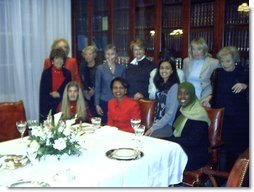
 |
For Immediate Release
Office of the Press Secretary
December 4, 2002
Remarks by National Security Advisor Condoleezza Rice at the Karamah Iftaar
Karamah
Washington, D.C.
DR. RICE: Thank you very much. It is a great honor for me to join you on this special evening, so close to the beginning of Eid al-Fitr.
 I particularly want to thank the founder of Karamah, Dr. Azizah
al-Hibri. You are a remarkable woman. We've had opportunities to
speak, and this remarkable organization -- I know that you've had
lots of help, but it is a wonderful organization and I congratulate you
on its founding and on its very good work.
I particularly want to thank the founder of Karamah, Dr. Azizah
al-Hibri. You are a remarkable woman. We've had opportunities to
speak, and this remarkable organization -- I know that you've had
lots of help, but it is a wonderful organization and I congratulate you
on its founding and on its very good work.
This is a distinguished group of people. Karamah is doing the valuable work of helping others to better understand that Islam is a great faith that inspires people to lead lives based on honesty, justice and compassion. Your work demonstrates that living the Islamic faith and striving for democracy and human rights are not only fully compatible, they are mutually reinforcing.
Karamah and its members are powerful reminders that millions of Muslims contribute to all walks of American life, from education to science to law and business, to public service and to the military. Karamah is, of course, a powerful advocate for human rights for all Muslims, but for women in particular. And the tradition of inviting members of other faiths -- like me -- to share in the Ramadan Iftaar symbolizes Islam's message of tolerance and appreciation of diversity.
The causes that Karamah cares about -- human rights, tolerance, dignity for all -- are central to world events. They are the causes that the children of Abraham, Muslims, Christians and Jews alike, should reflect upon as we gather with family and friends, according to each of our own holiday traditions.
You literally cannot understand what you read in the newspapers these days, without understanding that there is an ongoing struggle for human freedom and human dignity. This struggle is central to the world's efforts to confront terror and tyranny and poverty and disease. And it is central to our work, our mutual work, for a world that is both peaceful and just.
As Americans, we believe in what the President has called the nonnegotiable demands of human dignity; that the rule of law, free speech, equal justice, limits on the power of the state, respect for women and religious tolerance are desired by all human beings.
As human beings, we know that on every continent, in every culture, people given a choice between freedom and tyranny will choose freedom. And, as people of faith, we affirm that God is just and that here on earth we, as God's children, are morally responsible to seek justice.
So, as we move forward, let us be aware of our responsibilities and keep our most cherished values close to our hearts. Let us work for a world where all women and all girls, from Kansas to Kandahar, can pursue their dreams and live up to their potential. Let us work for a world where all people can choose for themselves the rewards and the challenges of liberty.
We must remember that freedom manifests itself differently around the globe and that it will manifest itself according to different heritages and traditions. And we must remember that democracy requires more than just elections, it also requires building the institutions of liberty.
Perhaps most importantly, let us remember that democracy is a journey, not a destination. It is something that you get up and you build day by day, brick by brick. America's own history has been one that teaches us to be humble about the hard work of building democracy. It has been a continuous struggle to live up to our own high ideals. When the framers of the American Constitution wrote, "We, the people," they did not mean me. My ancestors were three-fifths of a man and, indeed, it would be the 20th century before American women were given the right to vote. But little by little and day by day, we get closer to those ideals and to a society that is truly tolerant and diverse and just.
As we look outward to the world, it is a message that is worth remembering. And as we defend the deepest principles that we hold against terror and tyranny, we must live up to those principles ourselves. No one should be treated unkindly because of the color of their skin or the content of their creed. No one should be unfairly judged by appearance or ethnic background or religious faith. No religious faith should be held and slandered.
Once again, I want to thank you for having me here tonight. And, on behalf of the President -- who knows that I'm here and says hello -- let me wish all of you, all Muslims, a joyous Eid and health and happiness and prosperity in the year ahead. Thank you very much. (Applause.)
END